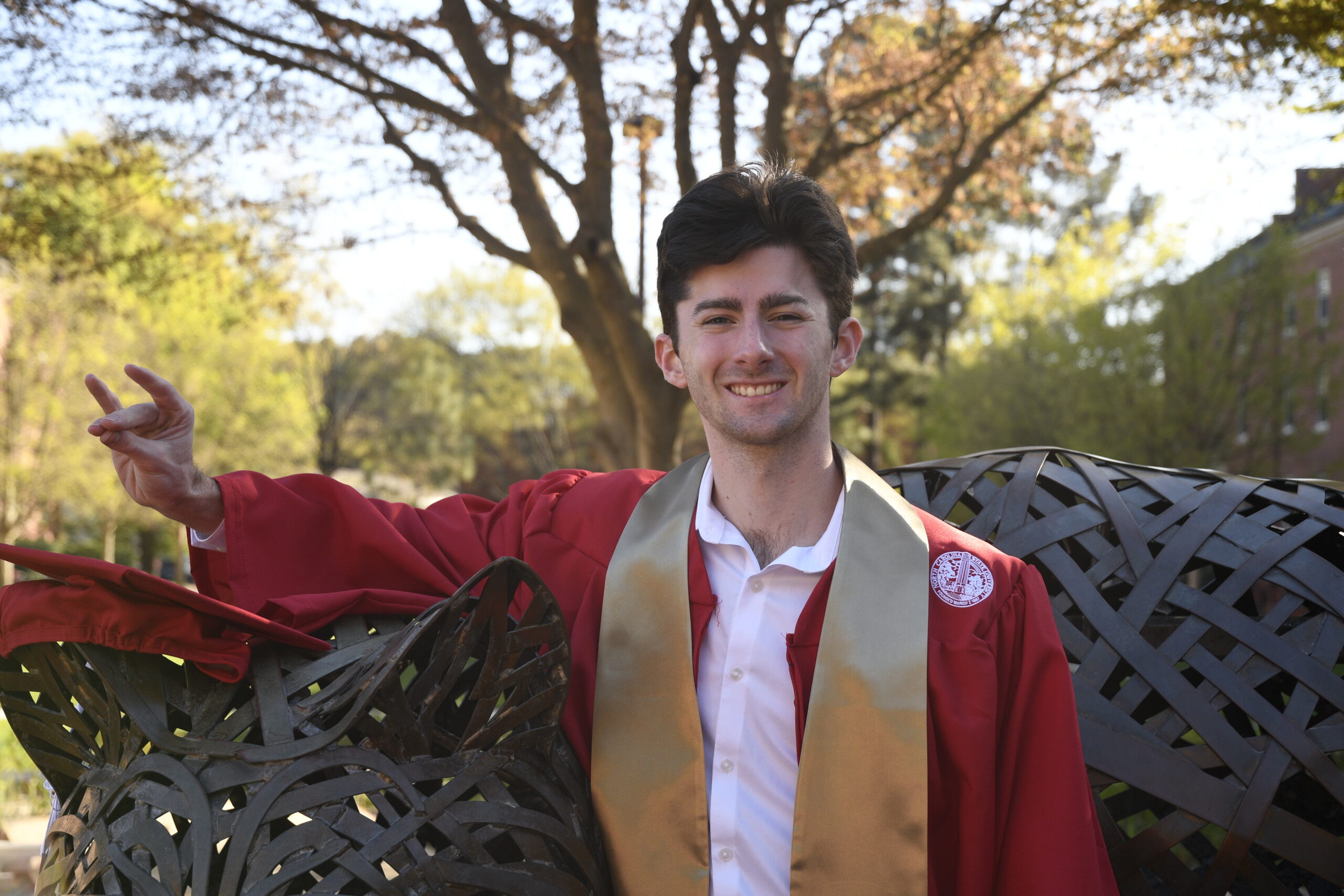DEFINING THE FUTURE OF BUSINESS: THROUGH SUSTAINABILITY
“Sustainability represents a sea change for many businesses, comparable to the impact of globalization,” said Scott Showalter, professor of practice in Poole College’s Department of Accounting and chair of the college’s Task Force on Sustainability.
He was quoting Dr. Peter Senge, MIT senior lecturer in leadership and sustainability, who had made the statement during a talk at the 2011 conference on sustainability hosted by AACSB-International, the accrediting body for business schools. Showalter had attended the conference as part of his information gathering for the college’s task force.
Dr. Mark Beasley, Deloitte Professor of Enterprise Risk Management, member of the task force and director of the college’s Enterprise Risk Management (ERM) Initiative, put it this way:
Strategically focused organizations are already realizing the need to think ahead 15-20 years to evaluate how and when their business model is likely to be impacted by unsustainable products and services critical to their supply chain, in addition to changes in customer demand for what is currently their ‘crown jewel’ product or service.
In the face of such challenges, Beasley said, “it is critical that the Poole College of Management integrate topics related to sustainability in our teaching, research, and engagement with businesses.”
Some of that is already happening.
“Our spring 2011 partners’ meeting focused on the topic, Applying Sustainable Principles to the Supply Chain,” said Dr. Rob Handfield, Bank of America Distinguished University Professor of Supply Chain Management, another task force member and director of the college’s Supply Chain Resource Cooperative (SCRC). Also, a number of the supply chain practicum projects completed by students with the SCRC partner companies have dealt with sustainability issues, he said.
BUILDING A BUSINESS CASE FOR SUSTAINABILITY
The college’s interest in building on what is already in place to create a strong focus on sustainability has evolved from the Poole College naming gift made by Lonnie C. Poole, Jr., a long-time advocate of sustainability in business and industry. At the time of the naming in December 2010, Dr. Ira Weiss, dean of the college, made a commitment to work toward creating a center of excellence in sustainability in the college, in recognition of Poole’s interest.
The first step, Weiss said, was to build a business case for developing such a center. The six-member task force was created in 2011, with the charge to conduct research that would guide the college’s future activity in this area. Showalter presented a summary of its report during a February 2012 meeting of the college’s faculty, which included:
- Detailed market analysis of sustainability trends and business drivers,
- Emerging regulations and standards related to sustainability reporting,
- Benchmarking of what other business schools are doing related to sustainability, and
- Market demands for talent and student placement.
The task force also documented activity that is already under way in Poole College. In addition to activities managed through the SCRC, the college offers a one-credit course on assessing corporate responsibility in the form of labor and human rights in the supply chain, open to the college’s Jenkins MBA students in any concentration. In this course, students complete a maturity assessment for a set of Fortune 500 companies to provide a rating of sustainable supply chain maturity.
Also, the student organization, Net Impact, based in the college, has held annual sustainability related conferences over the past year. In 2011, the organization hosted a day-long symposium on sustainability related careers, reaching out especially to undergraduate students across campus.
The task force also pointed to the college’s centers and initiatives as being in a unique position to engage with businesses on sustainability issues. Those units are:
- The Center for Innovation Management Studies (CIMS), in the Department of Management, Innovation and Entrepreneurship
- The Enterprise Risk Management Initiative (ERM), in the Department of Accounting
- The BioSciences Management Initiative (BioSci), in the Department of Management, Innovation and Entrepreneurship
- The Supply Chain Resource Cooperative (SCRC), in the Department of Business Management,
- The Entrepreneurship Collaborative (TEC), in the Department of Management, Innovation and Entrepreneurship
“To compete in the evolving global economy, entrepreneurial companies large and small are seeking products to produce and approaches to doing business that are not only sustainable, but are attractive to customers who are increasingly concerned with both ecological and the larger sustainability issues,” said Dr. Roger Mayer, professor in the Department of Management, Innovation and Entrepreneurship.
“In addition to the growing recognition that businesses must be managed in ways that protect the natural environment, there is a renewed recognition that sustainable companies must give more back to the social environment than they consume. This means different things to different companies, as varied as making a business case for sustainability systems, creating trust and legitimacy of ecological certification systems, and transforming organizational cultures to pursue sustainability,” he said.
Clarifying what it means for Poole College will continue as the faculty meets in a series of brown bag lunches in spring 2012 with industry leaders in sustainability, including Senge; Beth Ritter, vice president of human resources at Burt’s Bees; Miranda Ballentine, director of Sustainability at Wal-Mart; and researchers from four NC State colleges conducting sustainability related research.
Following is the full list of Poole College’s sustainability task force members.
- Dr. Mark Beasley, Deloitte Professor of Enterprise Risk Management (ERM) and director of the Enterprise Risk Management Initiative based in the Department of Accounting
- Dr. Rob Handfield, Bank of America Distinguished University Professor of Supply Chain Management and director of the Supply Chain Resource Cooperative (SCRC) based in the Department of Business Management
- Dr. Roger Mayer, professor, Department of Management, Innovation and Entrepreneurship (MIE)
- Paul Mugge, Professor of Practice and director of the Center for Innovation Management Studies based in the Department of Management, Innovation and Entrepreneurship
- Dr. Ray Palmquist, professor of natural resources and environmental economics in the Department of Economics
- Scott Showalter, professor of practice, Department of Accounting, task force chairman
In addition to his work with the task force, Showalter led a comprehensive assessment of sustainability-related research, including life cycle analysis, under way at NC State University’s 10 colleges.
His findings were discussed at a July 2011 meeting with Dr. Jonathan Johnson, a director of The Sustainability Consortium (TSC), attended by about 60 faculty members from various colleges across campus and other representatives of NC State’s research community.
Showalter also compiled a 50-page report on university-wide research. It showed that, in the sustainability arena and more specifically in life cycle analysis, “the combined and coordinated efforts of the university’s 10 colleges represent world class agricultural, analytical, economic, engineering, environmental, management, modeling and sociological know-how.” More than 200 multidisciplinary and discipline-specific research activities in virtually every discipline across NC State were noted in the report, with additional research indicated.
“We anticipate the outcomes from the work done by the task force will lead to significant activity around curriculum, research and engagement with other colleges on campus, as well as new opportunities in business and industry,” Weiss said.
CONTACTS
For additional information, please contact Scott Showalter, Poole College Sustainability Task Force chairman.
PHOTO
Poole College’s Sustainability Task Force members are, left to right: Mark Beasley, Rob Handfield, Roger Mayer, Paul Mugge, Ray Palmquist and Scott Showalter.


